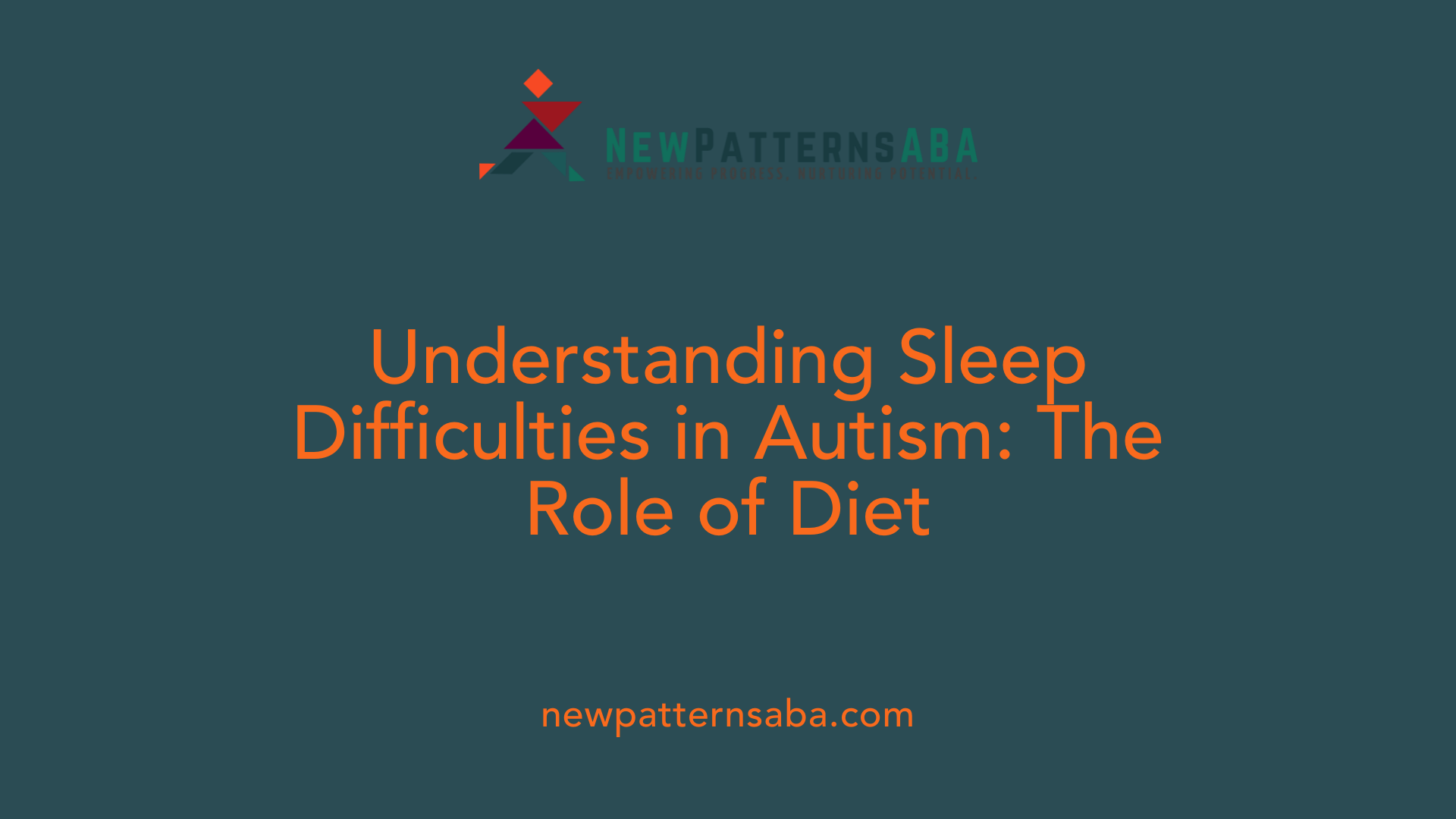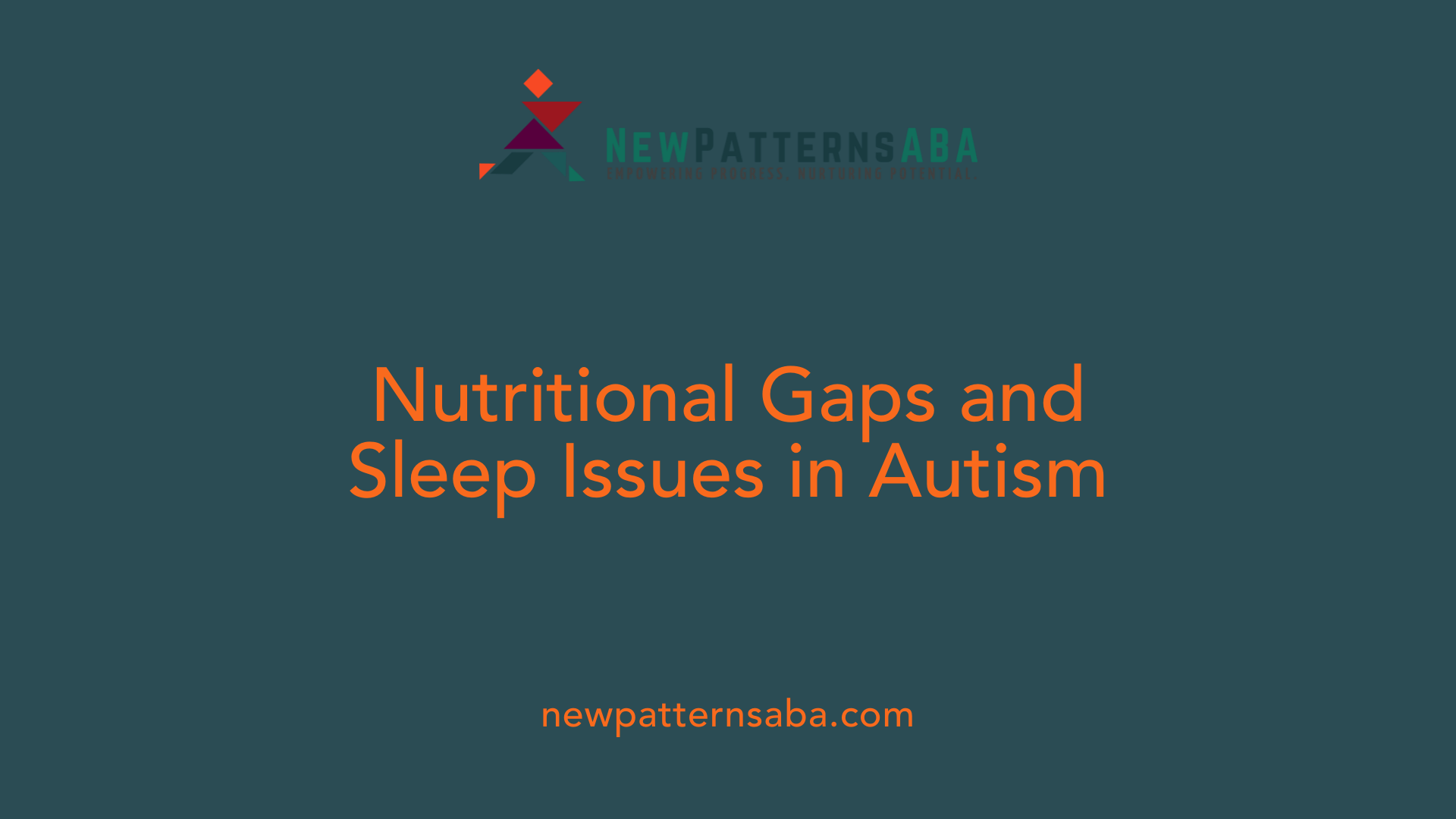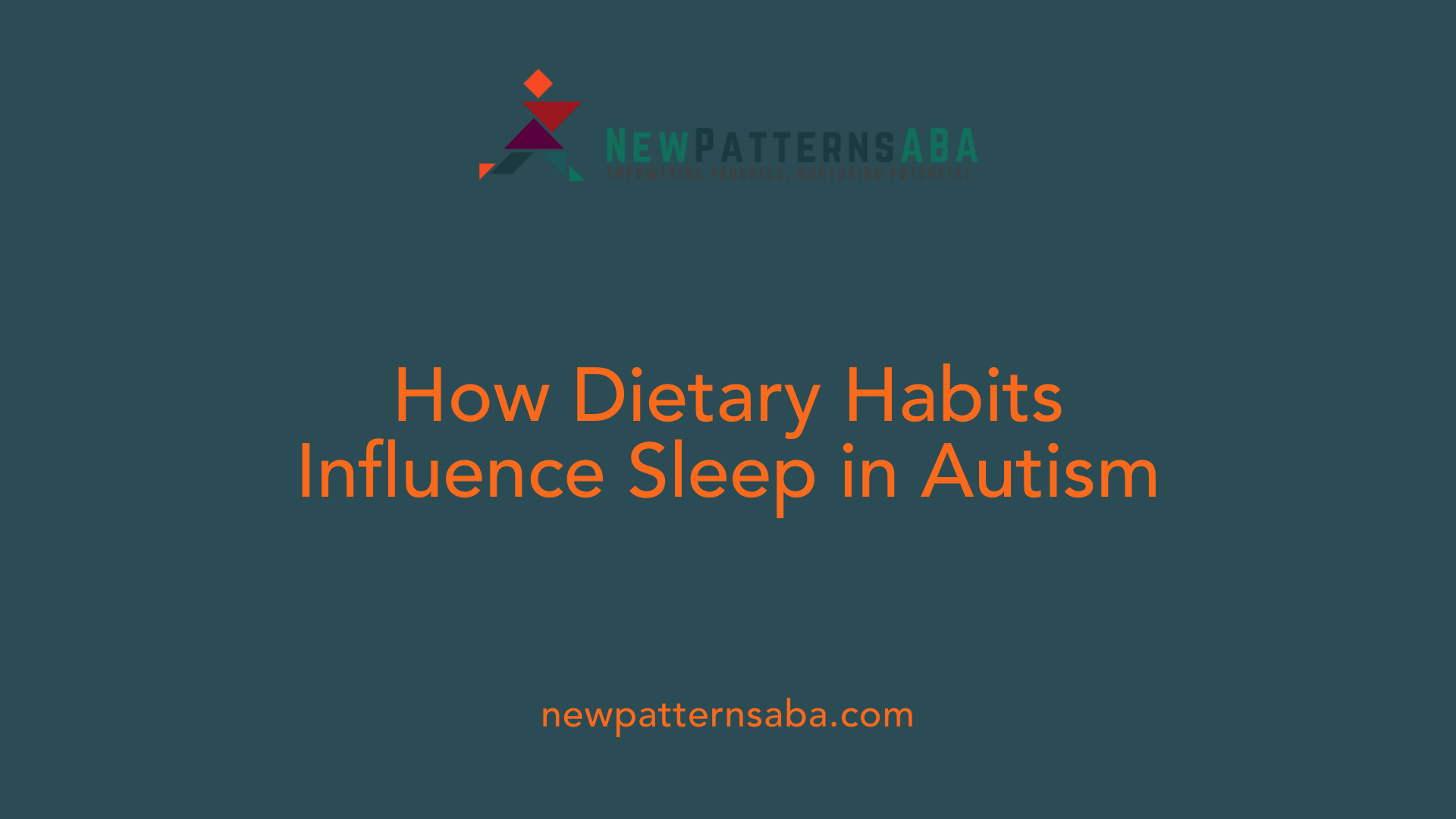Understanding the Connection Between Diet and Sleep in Autism
Sleep disturbances are highly prevalent among individuals with autism spectrum disorder (ASD), affecting between 50% and 83% of this population. These sleep challenges include difficulties in falling asleep, frequent awakenings, irregular sleep patterns, and circadian rhythm disruptions. Recent research highlights the critical role that diet and nutritional intake play in influencing sleep quality, underscoring the importance of targeted dietary strategies and lifestyle modifications to improve sleep health in autistic individuals.
Common Sleep Challenges in Autism and the Role of Diet

What are some common sleep challenges faced by individuals with autism, and how might diet influence these issues?
Children and adults with autism frequently encounter sleep difficulties, including trouble falling asleep, maintaining sleep through the night, early morning awakenings, and restless sleep behaviors. Insomnia symptoms affect around 50% to 80% of children on the spectrum, making sleep disturbances significantly more common than in neurotypical populations.
These challenges are often compounded by physiological and environmental factors. For example, irregularities in circadian rhythms—our internal biological clocks—are common among autistic individuals. Such disruptions can stem from genetic variations influencing melatonin production or from abnormalities in neurotransmitter systems like GABA and serotonin, which are vital for sleep regulation.
Nutrient deficiencies are also tightly linked to sleep problems. Hormones such as melatonin and serotonin are synthesized based on nutrients obtained through diet. Deficiencies in key nutrients like calcium, magnesium, vitamins D, B6, B12, and amino acids such as tryptophan can impair the synthesis of these hormones, thus disrupting the sleep-wake cycle.
Dietary factors are crucial because they can directly influence hormone levels and circadian regulation. Consuming nutrient-rich foods such as dairy products, oily fish, nuts, seeds, eggs, and vegetables provides the building blocks for neurotransmitter and hormone production. For instance, tryptophan-rich foods promote serotonin and melatonin synthesis, encouraging better sleep.
Meal timing and routines can also impact sleep quality. Regularly scheduled meals, avoiding caffeine and sugar before bedtime, and establishing calming evening routines can help synchronize internal rhythms and ease sleep onset.
Herbal supplements like valerian, chamomile, and lavender, along with adaptogens such as ashwagandha, may offer additional relaxation benefits and support sleep quality, although their use should be guided by healthcare professionals.
The connection between diet and sleep in autism is also reflected in gut health. Balancing the gut microbiome through probiotics and digestive enzymes can improve digestion and reduce irritability, which may contribute to better sleep.
Overall, addressing nutritional deficiencies, maintaining consistent eating patterns, and incorporating sleep-promoting foods and supplements can help mitigate common sleep problems in individuals with autism, fostering healthier sleep cycles and overall well-being.
Impact of Nutritional Deficiencies on Sleep in Autism

What is known about the impact of diet and nutrition on sleep quality in individuals with autism?
Research indicates that diet and nutrition play a crucial role in determining sleep quality in individuals with autism. Numerous studies have identified deficiencies in key nutrients such as omega-3 fatty acids, vitamin D, magnesium, zinc, calcium, and B vitamins as common among autistic individuals. These deficiencies are often associated with sleep disturbances, including difficulty initiating sleep, fragmented sleep patterns, and reduced sleep duration.
Omega-3 fatty acids, especially EPA, are vital for brain health and have been shown to improve sleep, mood, and behavioral regulation. Sources include oily fish like salmon and mackerel, as well as seeds such as flaxseed and chia. Vitamin D, which can be synthesized through sunlight exposure and is present in foods like fatty fish and fortified dairy products, modulates immune function and hormone regulation, including melatonin synthesis.
Minerals such as magnesium and zinc are involved in neural excitability and neurotransmitter function. Magnesium-rich foods, including nuts, seeds, and leafy greens, help promote relaxation and sleep onset. Calcium, found in dairy products, eggs, and green vegetables, acts as a precursor for melatonin synthesis, assisting in sleep regulation. B vitamins like B6 and B12 are essential for neurotransmitter production, including serotonin, which influences mood and sleep regulation.
Nutritional deficits can directly impact the functioning of hormones like melatonin and serotonin, which are critical for maintaining circadian rhythms. Low levels of these hormones can lead to misaligned circadian cycles and sleep-wake disorders common in autism.
Eating habits also influence sleep quality. Diets rich in complex carbohydrates and tryptophan—the amino acid precursor to serotonin—can promote better sleep. Foods such as turkey, eggs, dairy, and nuts provide tryptophan, supporting the neurochemical pathways involved in sleep.
Lifestyle strategies alongside nutritional adjustments include establishing consistent routines, controlling environmental factors like light and noise, and limiting screen exposure before bedtime. Incorporating relaxation techniques like warm baths or herbal remedies such as valerian or chamomile can further calm the nervous system.
Supplements like GABA, melatonin, or adaptogens like ashwagandha have been explored for their sleep-promoting effects in autistic individuals. When combined with dietary improvements, these interventions can help normalize sleep patterns and reduce stress-related cortisol levels.
In summary, ensuring adequate intake of essential nutrients through diet or supplementation, alongside behavioral and environmental modifications, can significantly improve sleep quality in individuals with autism. Addressing these nutritional deficits not only enhances sleep but also supports overall neurodevelopment and behavioral health.
Lifestyle Adjustments to Promote Restful Sleep

What lifestyle adjustments, including diet, can help manage sleep disturbances in autism?
Sleep issues are common among individuals with autism, often linked to behavioral, physiological, and environmental factors. Making targeted lifestyle changes can significantly improve sleep quality.
One of the most effective strategies is establishing consistent routines. Regular bedtime and wake-up times help regulate the circadian rhythm, making it easier to fall asleep and stay asleep. A calming bedtime routine, such as warm baths or gentle stretches, can reduce bedtime anxiety and signal to the body that it’s time to sleep.
Creating a sleep environment that minimizes sensory input is also crucial. Using blackout curtains to darken the room, maintaining a comfortable temperature, and reducing noise with white noise machines can help create a soothing atmosphere. Limiting exposure to bright screens and electronic devices before bed is recommended, as blue light can interfere with melatonin production, a hormone essential for sleep regulation.
Nutrition plays a vital role in sleep health. Consuming foods rich in nutrients like calcium, magnesium, and vitamins D, B6, and B12 supports hormonal pathways linked to sleep. For example, tryptophan, an amino acid found in eggs, dairy, nuts, and seeds, is a precursor to serotonin and melatonin, promoting sleepiness. Ensuring a balanced diet that includes vegetables, fish, eggs, and dairy can help maintain healthy sleep cycles.
In addition, relaxation techniques such as deep breathing, mindfulness, and yoga can alleviate bedtime anxiety and prepare the nervous system for restful sleep. Herbal supplements like chamomile, valerian, lavender, and adaptogens such as ashwagandha may support relaxation, especially when used under professional supervision.
Limiting stimulating activities in the hour before bed, avoiding caffeine and sugary snacks, and encouraging physical activity during the day can also help synchronize the sleep-wake cycle. These lifestyle modifications, when integrated thoughtfully, can greatly improve sleep health for individuals with autism, enhancing their overall well-being.
The Significance of Dietary Habits in Managing Sleep Problems

How can understanding dietary habits help improve sleep issues in autistic individuals?
Examining dietary habits is essential in understanding and managing sleep difficulties among individuals with autism. Many children with ASD struggle with selective eating, food sensitivities, and eating behaviors like food refusal or pica, which can directly influence sleep quality.
Selective eating often results in nutritional deficiencies that impair hormonal pathways involved in sleep regulation. For instance, insufficient intake of nutrients such as magnesium, vitamin D, B6, and tryptophan—found in foods like dairy, fish, nuts, seeds, and vegetables—can disrupt neuroendocrine functions essential for healthy sleep cycles.
Additionally, sensory sensitivities common in autism may make certain textures, tastes, or smells intolerable, leading to irregular eating routines. Such routines are crucial since consistent mealtime patterns help reinforce circadian rhythms by providing external cues that align with the internal biological clock.
Behavioral routines around food can also minimize anxiety, which is known to interfere with sleep. For example, establishing a predictable dinner schedule and post-meal calming activities can reduce bedtime resistance and improve sleep latency.
Nutritional interventions focused on balanced intake of key nutrients can positively affect sleep and behavioral outcomes. Supplementation with omega-3 fatty acids, magnesium, or melatonin, under professional guidance, has shown promise in enhancing sleep quality.
Furthermore, addressing gut health through probiotics and tailored diets may alleviate gastrointestinal discomfort, which is associated with worse sleep and behavioral challenges in ASD.
Overall, understanding individual dietary patterns enables personalized strategies that not only improve nutritional status but also promote better sleep hygiene and behavioral stability.
Gastrointestinal Health and Its Connection to Sleep in Autism

How are gastrointestinal health and diet related to sleep issues in autism?
Gastrointestinal (GI) health and diet play a significant role in the sleep patterns of individuals with autism. Many children and adults on the spectrum experience GI problems such as dysbiosis, reflux, and food sensitivities, particularly to gluten and casein. These issues can cause physical discomfort, pain, and irritability, which often disrupt sleep cycles.
Research shows that GI problems are not just symptoms but can actively influence sleep quality through the gut-brain axis—a complex communication network between the gastrointestinal system and the brain. Disruptions in this axis can affect neurochemical pathways involved in sleep regulation, mood, and behavior.
Addressing these challenges involves multiple strategies. Dietary adjustments such as eliminating triggers like gluten and casein, and increasing intake of supportive nutrients (magnesium, vitamins B6, B12, D) can help restore gut balance and improve sleep. The use of probiotics to enhance healthy gut microbiota has also been associated with reductions in GI symptoms and better sleep.
Nutrient supplementation, especially with compounds like magnesium and vitamins, supports neurological function and hormonal pathways linked to sleep, such as melatonin production. Additionally, targeted probiotic therapy aims to rebalance the microbiome, which can influence behavior, irritability, and sleep quality.
Implementing these interventions often involves collaboration among healthcare providers, dietitians, and therapists to develop personalized plans. These approaches have the potential not only to relieve gastrointestinal discomfort but also to improve sleep patterns and overall behavioral health.
Interrelated nature of GI health, diet, and sleep in autism
The connection between gut health and sleep is increasingly recognized in autism research. Children with ASD who suffer from GI symptoms tend to show more severe behavioral and developmental challenges, including poorer sleep and social functioning.
By improving gut health through dietary modifications and probiotic use, many individuals experience not only relief from GI discomfort but also improvements in sleep onset, duration, and quality. Such interventions help regulate hormones like melatonin and other neurochemical pathways, contributing to more stable circadian rhythms.
Ensuring adequate nutrient intake through diet supports the neuroendocrine pathways involved in sleep and behavior. Foods rich in probiotics such as fermented foods, along with dietary sources of essential nutrients like fish, nuts, seeds, vegetables, and dairy, promote a healthy microbiome and support overall health.
Strategies to enhance gut health and sleep
| Strategy | Description | Expected Benefits | Additional Notes |
|---|---|---|---|
| Dietary Elimination | Removing gluten, casein, and processed foods | Reduced GI symptoms, improved sleep | Implement under professional guidance |
| Probiotics | Supplementation with beneficial bacteria | Restored microbiota, better digestion, sleep | Choose strains like Lactobacillus and Bifidobacterium |
| Nutritional Support | Intake of magnesium, vitamins B6, B12, D, and amino acids like tryptophan | Hormonal regulation, sleep hormone support | Incorporate through diet and supplements |
| Gut-Targeted Therapies | Fermented foods, digestive enzymes, and fiber intake | Improved gut flora, reduced irritability | Tailored to individual sensitivities |
Broader implications and future directions
Enhancing gastrointestinal health is a promising pathway to improve sleep and overall well-being in individuals with autism. Current evidence supports multidisciplinary approaches that combine dietary management, nutritional supplementation, and probiotic therapy.
Ongoing research aims to better understand how gut microbiota influence neural pathways related to sleep, anxiety, and behavior. Personalized treatments based on gut microbiome analysis may become a standard part of autism management.
In summary, optimizing gut health through diet and supplementation not only alleviates GI symptoms but also positively impacts sleep quality, leading to improvements in behavior, cognition, and emotional regulation. Recognizing the bidirectional relationship between the gut and the brain emphasizes the importance of holistic approaches to supporting individuals with autism.
Dietary Interventions and Supplements to Enhance Sleep
What dietary interventions can help improve sleep in individuals with autism?
Diet plays a significant role in promoting healthy sleep patterns, especially in children and adults with autism spectrum disorder (ASD). Ensuring an adequate intake of specific nutrients can support hormonal pathways that regulate sleep. Nutrients like calcium, magnesium, and vitamins B6, B12, D, E, and K are essential. These are abundant in foods such as dairy products, fish, nuts, seeds, eggs, and vegetables.
A balanced diet that incorporates carbohydrate-rich foods, particularly whole grains, consumed three to four hours before bedtime, can enhance melatonin synthesis. These carbohydrates help in the production of tryptophan, an amino acid that is a precursor to serotonin and melatonin—hormones vital for sleep regulation.
In addition to micronutrients, herbal remedies like chamomile, lavender, valerian, and adaptogens such as ashwagandha and holy basil are used to promote relaxation and improve overall sleep quality. These herbs are commonly prepared as teas, supplements, or oils and have been traditionally employed to soothe the nervous system.
Gut health is another crucial factor. Diets including probiotic-rich foods like yogurt, fermented vegetables, and supplements aim to restore balance in gut microbiota. This can alleviate gastrointestinal symptoms often associated with ASD, which are linked to sleep disturbances. Moreover, some children benefit from gluten-free and casein-free diets, which may reduce neuroinflammatory responses and behavioral issues, indirectly improving sleep.
Lifestyle modifications should complement dietary changes. Managing circadian rhythms through consistent sleep and wake times, reducing screen exposure before bedtime, and controlling sleep environment lighting and noise contribute to better sleep outcomes.
What neurochemical and biological mechanisms link diet to sleep regulation in autism?
Diet influences sleep at a neurochemical level by modulating neurotransmitter synthesis. Serotonin, a key neurotransmitter in sleep initiation, is generated from dietary tryptophan, which is found in foods such as turkey, eggs, and nuts. Adequate intake of omega-3 fatty acids, especially EPA and DHA from oily fish and seeds, supports membrane fluidity and receptor function affecting serotonin and GABA pathways.
GABA is the brain’s major inhibitory neurotransmitter and promotes sleep by reducing neuronal excitability. Dietary intake of magnesium and vitamin B6 can enhance GABAergic activity, aiding sleep onset and maintenance.
Hormonal regulation also plays a role. Melatonin, produced by the pineal gland, is influenced by carbohydrate consumption, which sustains tryptophan availability for serotonin and melatonin synthesis. In ASD, genetic variations in circadian clock genes, like PER1, PER2, and NPAS2, may hinder this process, but dietary interventions can help mitigate some effects.
Furthermore, lipid metabolism impacted by diet affects the structural components of neurons involved in sleep regulation. Imbalances in these lipids can lead to disrupted neural circuitry responsible for sleep-wake cycles.
In summary, diet influences neurochemical pathways—such as serotonin, GABA, and melatonin production—and genetic regulation of circadian rhythms. Together, these mechanisms are crucial in understanding sleep disturbances in autism and potential dietary strategies to address them.
Neurobiological Foundations of Sleep in Autism
What neurochemical and biological mechanisms link diet to sleep regulation in autism?
In individuals with autism, diet plays a significant role in influencing neurochemical pathways that are central to sleep regulation. Essential nutrients such as omega-3 fatty acids, vitamins B6 and D, magnesium, and amino acids like tryptophan impact the synthesis of neurotransmitters that promote healthy sleep.
Serotonin, a key neurotransmitter involved in mood and sleep, is derived from tryptophan, which is obtained from dietary sources like eggs, nuts, and seeds. Disruptions in serotonin levels can impair sleep onset and quality. GABA (gamma-aminobutyric acid), the brain's primary inhibitory neurotransmitter, is also affected by dietary intake, especially through the availability of magnesium and amino acids, influencing sleep initiation and microstructure.
The hormone melatonin, vital for circadian rhythm regulation, is synthesized from serotonin. Dietary intake of nutrients like vitamins B6 and magnesium are necessary for optimal melatonin production. In ASD, abnormal melatonin levels are common, partly due to dietary deficiencies, which can delay sleep onset and disrupt sleep cycles.
Genetic factors also play a role; mutations in circadian clock genes such as PER1, PER2, and NPAS2 are observed in autism and can interfere with circadian regulation. These genes interact with metabolic pathways influenced by diet, creating a complex network where nutritional status impacts gene expression and biological rhythms.
Additionally, dietary fats influence lipid profiles in the brain, affecting membrane fluidity and receptor function involved in neurotransmitter signaling. Imbalances in lipids may lead to altered neurochemical activity, further disrupting sleep circuits.
In summary, diet modulates several biological and neurochemical mechanisms—such as neurotransmitter synthesis, hormonal regulation, and gene expression—that collectively influence sleep patterns in autism. Addressing nutritional deficiencies and optimizing diet may help restore some aspects of sleep regulation in autistic individuals, enhancing overall health and daily functioning.
Integrating Diet and Lifestyle for Better Sleep in Autism
Understanding the complex relationship between diet and sleep in autism spectrum disorder reveals promising avenues for intervention. Nutritional strategies that incorporate nutrient-rich foods, address deficiencies, and consider gut health can significantly improve sleep quality. Lifestyle modifications such as establishing consistent routines, managing light exposure, and practicing relaxation techniques complement dietary adjustments, creating a holistic approach to better sleep. Ongoing research into neurochemical and genetic mechanisms further underscores the importance of personalized nutrition in managing sleep problems. By prioritizing dietary and lifestyle interventions, caregivers and healthcare professionals can enhance sleep health and overall well-being in autistic individuals, leading to improved developmental and behavioral outcomes.
References
- Food and Sleep - Autism Research Institute
- Eating and sleep problems, related factors, and effects on the mental ...
- Sleep, diet and exercise | Autism Awareness Australia
- An investigation of the diet, exercise, sleep, BMI, and health ...
- Sleep Problems Linked to More Severe Autism Symptoms
- Sleep in autism: A biomolecular approach to aetiology and treatment
- Unhealthy patterns of diet, exercise, and sleep linked to high risk of ...
- Sleep in Autistic Adolescents and Adults - Stanford Medicine





